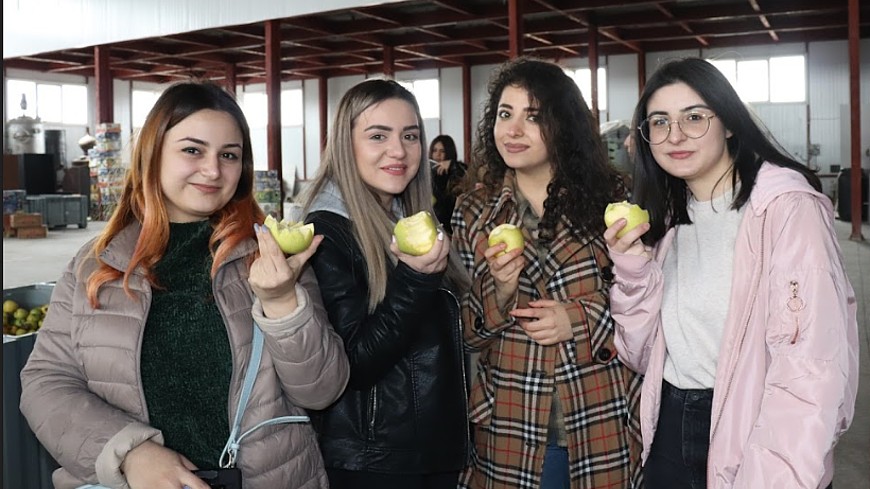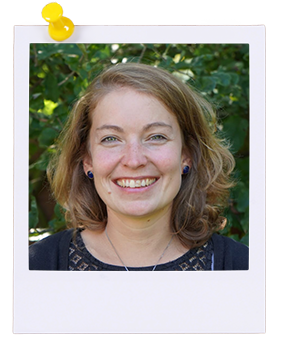Lack of youth participation in agricultural
by Sara Neagu, Claire Perrot-Minot and Manon Rousselot-Pailley
18/12/2020
The benefits of youth participation in schools, in youth policies or in environmental debate might be obvious for a lot of people. It is maybe less the case in agricultural and rural development policies. Nevertheless, for organisations representing rural youth such as MIJARC Europe, CEJA or RYEurope, it is imperative to allow the participation of young people in the policies of agriculture and rural development. Here’s why.
 What we learnt from youth participation in policies last year …
What we learnt from youth participation in policies last year …
In 2019 MIJARC Europe’s work plan focused on citizenship and youth participation. It was the year of the elections for the new European Parliament, therefore it was easy to see the importance of the topic. Throughout that year, the Have Your Say! manual (from the Council of Europe on the topic of the participation of young people in local life) was the book everyone from MIJARC Europe’s team had on their side table!
To be sure to get the realities of all the countries of our member organisations, we organised so-called “local visits”. Our volunteers went to 10 different countries to implement workshops in order to define youth participation from our young people’s perspective, to assess the youth participation within organisations and countries, and to identify the barriers to youth participation in national contexts. We were very surprised to discover that most of the results for each of the 10 countries were similar and comparable.
First, we all agreed that “youth participation means to take part in the life of the community, work as a volunteer, take responsibility, organize projects and demonstrations in order to build a better society” (MIJARC Europe 2019: 8). This definition is very close to the one assumed in the Have Your Say! manual:
Participation in the democratic life of any community is about more than voting or standing for election, although these are important elements. Participation and active citizenship is about having the right, the means, the space and the opportunity and where necessary the support to participate in and influence decisions and engaging in actions and activities so as to contribute to building a better society. (Council of Europe 2015a:12)
Starting from this, many of the young people assessed the degree of youth participation in their own organisations as good to very good. They underlined the possibilities available in order to be able to make decisions and organise activities on their own, that adults had a supporting role and that their organisations functioned democratically.
Through these local visits we found the following obstacles to youth participation:
- The first one was the time and the motivation, agreeing that this is a very personal, and most of the time, “self-made” obstacle.
- The second one was the lack of information, experience and communication from the young person’s side. They often don’t know what opportunities they have to participate, which competences each local or regional authorities have and the communication rules to address them.
- The last one was the national culture and the environment of the young person which might not be supportive towards speaking up and participating. (MIJARC Europe 2019)
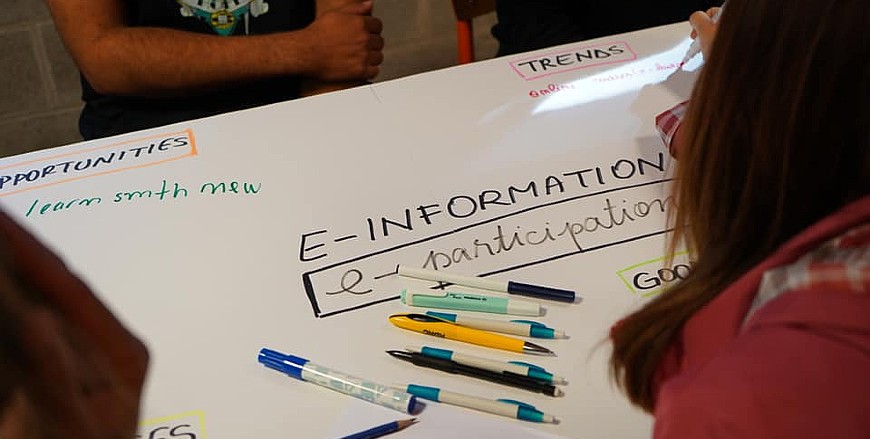
 … and what we’re learning about their participation in agricultural policies this year
… and what we’re learning about their participation in agricultural policies this year
After we discovered these barriers, MIJARC Europe, an organisation representing youth from rural areas, decided to take a closer look at youth participation applied to the field of agriculture and rural development.
We conducted in-depth research on the current situation of agriculture in Europe and the place that young people occupy in this great machine of food system. What we discovered is telling us how much youth participation is missing in agricultural policies and it underlines the importance for rural youth organisations to focus on this.
We have therefore consulted many statistics (in particular those of Eurostat) and the conclusion is indisputable: the number of farms and farmers is declining and farmers are getting older and older. Only one farmer in 10 is 40 years old or younger, while 57.5% of farmers are 55 years old or older! Despite vocations for farming, difficulties in setting up and maintaining a viable activity, low income and indebtedness, harsh working conditions with long hours, and the hard knocks that hit farmers every year (market crises, collapse of milk prices, a drop in public aid, climate adverse events, including droughts...) are all impeding factors that dissuade and make it more complex for young people to take up access to the sector.
In addition to this, young people in rural areas are not much better off. Indeed, people living in rural areas are more likely to be exposed to poverty and social exclusion than those living in cities (particularly in Romania, Bulgaria and Malta). Moreover, young people experience a higher rate of unemployment and non-enrolment (the average in the EU is 17.5% in rural areas compared to 14.2% in cities but the gap is sometimes much wider, like in Bulgaria where there is a share of 42% of youth unemployment in rural areas against 12% in cities, according to Eurostat figures).
Moreover, one of the most striking aspects when doing this research was the lack of information about agricultural policies. According to a survey entitled Europeans, Agriculture and the CAP conducted in 2013 among European citizens and published in 2016, 56% of those polled said they were aware of the main principle of the Common Agricultural Policy (CAP, supporting farmers by distributing aid) but did not know the details. And indeed, the CAP is an extremely complex system with agricultural, economic and environmental mechanisms that make it difficult to popularise it among European citizens. For young people, the lack of knowledge is even more striking: only 46% of the interviewees aged 15-24 years said they had heard about the CAP and 52% of them said they had never heard of it.
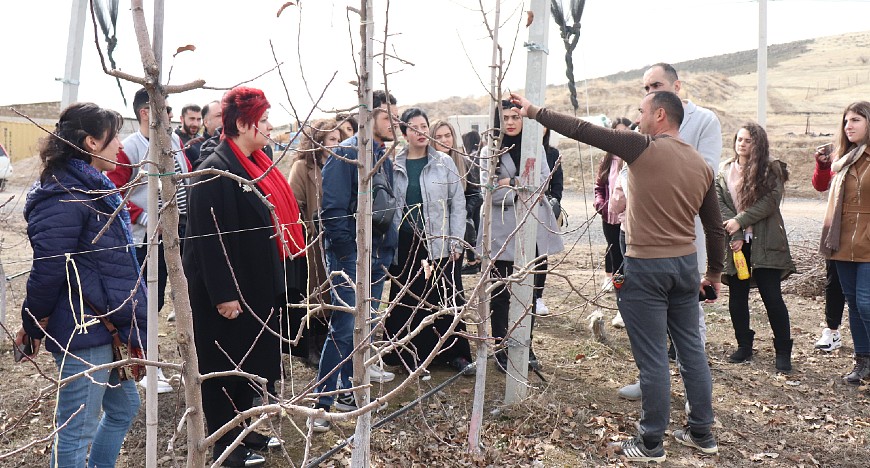
Young farmers' organisations, such as CEJA and its membership, are using capacity-building activities and representation activities to make the voice of young farmers heard in decision making. Such involvement has led to making one of the objectives of the future CAP to attract and sustain young farmers in the sector. Still they observe that in some member states in particular, young farmers have difficulties in accessing dialogue with decision makers (i.e. in Strategic Plans discussions). Outside of the farming system, young people from rural areas need the tools to participate in the system that feeds them and energise the rural environments in which they live. The first of these tools would be information. Concerning youth participation in agricultural policies, there are no figures besides very few examples of meetings held with young people, always at the initiative of rural youth organisations. And we are not just talking about the EU in general, but for each individual EU country.
 What rural youth organisations do to help change the situation
What rural youth organisations do to help change the situation
The lack of knowledge of European citizens about agricultural policies (especially among young people) is therefore the first problem we will address. If young people are not aware of the opportunities they have to participate in the agricultural policies of their country and in the EU, this is our role, as a youth organisation, to help them see these chances. Why so? You may ask. After all, maybe the lack of information on agriculture and the CAP comes from the fact that European young people are just not interested. Maybe agriculture in general is none of their concern. We believe otherwise. Climate protests that bring together a growing number of people, more and more universities creating associations supporting small farming, the increasing number of topics on the internet media on the subject of eating habits (veganism, less meat, eating locally…) are all things that are being set up on the initiative of young people. The young generation is deeply concerned about the future of the environment and on food issues. They simply often lack the proper tools to create the change they aspire to.
At the seminar we are currently preparing on the topic of youth participation in agriculture and agricultural policies, we intend to talk about what an agricultural policy is, how the CAP works, so that young people can understand the role they can play in it. It is to this end that we base our activities on the Council of Europe’s European Charter on the Participation of Young People in Local and Regional Life and the Have Your Say! manual, and also to help them realise the tools they have to make their voices heard, and the legitimacy they have to do so.
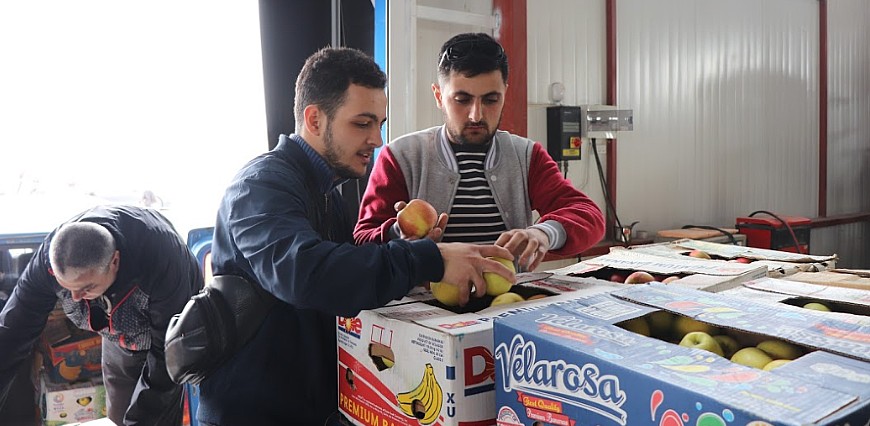
With our social media campaign Grow It Yourself, which we launched at the beginning of April, we wished to offer a fun challenge, through the publication of photos on social networks, to encourage people to grow their own fruit and vegetables or herbs. With every photo we post, we add a caption or a link to an article that we publish on our website, in which we discuss topics related to the food system and all the issues it involves. The feedback we received from our followers who took up the challenge during the COVID-19 confinement has confirmed the deep interest that young people have in the origin and quality of the food they have on their plates. We often just need to create opportunities for them to be actors in this kind of field situation rather than being subjected to the food system as it exists.
Together with CEJA and Rural Youth Europe, we represent young farmers and rural youth in almost all countries of the European Union and beyond. We see it as our responsibility to work together and raise awareness of the challenges young people are facing in rural areas so that they are not forgotten. For example, we published a Manifesto addressing the new members of the European Parliament in 2019.
The local visits we organise for each member country of MIJARC Europe, the second day of our seminar where we question our knowledge about the food system, the farmers, market gardeners and founders of associations supporting small and local farming to whom we give the floor… All these projects serve our purpose: to show how rural youth can participate and support agriculture without necessarily being farmers.
 Youth participation is not an end in itself,
Youth participation is not an end in itself,
“but a means of achieving positive changes in young people’s lives and of building a better society” (Council of Europe 2015b: 9). As a rural youth organisation, our role is to strengthen youth participation in the areas our members are living and working. By empowering rural youth we ensure that they can bring their ideas for rural areas not to be left on the sidelines and to become attractive places for all generations to study, to work and to live. Rural areas are facing challenges that are common in urban places but are also very specific. A bigger involvement of rural youth (and youth in general, not only those living among farmers, but young people in cities are often the very first ones to search for solutions to improve the way they eat) in agricultural and rural development policies, would be a big step forward in order to tackle the challenges of the 21st century.
 References
References
CEJA, Rural Youth Europe, MIJARC Europe (2019), Empowering Young Farmers and Rural Youth, available at www.ceja.eu/press-releases/200, accessed 22 July 2020.
Council of Europe (2015a), Have Your Say! Manual on the revised European Charter on the Participation of Young People in Local and Regional Life, available at https://rm.coe.int/16807023e0, accessed 22 July 2020.
Council of Europe (2015b), Revised European Charter on the Participation of Young People in Local and Regional Life, available at https://rm.coe.int/168071b4d6, accessed 22 July 2020.
Eurostat (2019), Agriculture, forestry and fishery statistics, Luxembourg: Publications Office of the European Union.
Eurostat (2017), Statistics on rural areas in the EU, Eurostat regional yearbook.
MIJARC Europe (2019) Report on the state of youth participation, available at https://mijarceurope.net/2019/12/03/new-report-on-the-state-of-youth-participation/, accessed 22 July 2020.
Special Eurobarometer 473 (2018), Europeans, Agriculture and the CAP, Survey requested by the European Commission.

